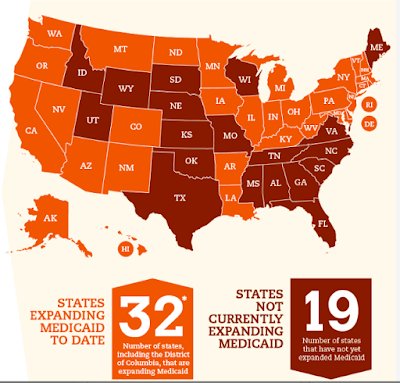On April 15th, access to care and treatment took center stage in Birmingham, Alabama as the ADAP Advocacy Association hosted a roundtable discussion on the "Future of ADAP in Medicaid Non-Expansion States." It is an issue with deep rooted concerns among people living with HIV/AIDS, especially since the Affordable Care Act ("ACA") was designed to expand both. According to Families USA, there are currently 19 non-expansion states...mostly situated in the South, and rural states in other parts of the country.
 |
| Photo Source: Families USA |
One of the most troubling unintended consequences of the ACA has been exacerbated health disparities in the South, evidenced by only three southern states having expanded their Medicaid programs (Arkansas, Louisiana, and West Virginia). Yet the South is arguably the area of the country that needs greater access to care and treatment, and not less.
The forum included perspectives from Alabama, and Florida -- both Medicaid non-expansion states. At issue was navigating how to advocate around the new ACA-led healthcare world increasingly driven by an insurance model, rather than a service-delivery model. For example, new barriers have emerged preventing some people living with HIV/AIDS from obtaining medications that may have been previously more accessible to them.
Aside from Alabama and Florida, other non-expansion states represented at the forum included Georgia, North Carolina, and Tennessee. The forum included an in-depth policy discussion with the following panelists:
- Joey Wynn, Community Relations Director, EmpowerU
- Michael J. Mugavero, MD, MHSc, Professor of Medicine, University of Alabama at Birmingham
- Alex Smith, Director of Policy and Advocacy, AIDS Alabama
- Warren Dates, Sr. Peer Linkage Specialist, Alabama Department of Public Health
 |
| L-R: A. Smith, Dr. M. Mugavero, W. Dates, and J. Wynn |
In Alabama -- where Blue Cross Blue Shield yields a monopoly on the state's insurance market -- efforts continue to focus on prioritizing services for people living with HIV/AIDS. On a positive note, ADAP waiting lists have been completed eliminated and client advocacy has become more specialized by focusing on related issues (i.e., housing and transportation).
In addition, Alabama’s Insurance Assistance Program (AIAP) was launched in 2015, providing cost- effective health insurance to eligible clients. This approach to linking clients to timely, appropriate care and treatment is paying dividends with outcomes, too. According to the State of Alabama AIDS Drug Assistance Program (ADAP) Quarterly Report, "The majority of clients actively served by ADAP reported viral suppression (i.e., viral load ≤ 200 copies/mL) at the last viral load test collected during the preceding 12 months. However, the level of viral suppression varied by service category with MEDCAP reporting the most virally suppressed clients (89 percent), followed by AIAP (79 percent) and ADAP (56 percent). As only fifty-six percent of active ADAP clients are virally suppressed, this indicates a need for improved adherence to antiretroviral therapy (ART) and retention in care in this service category."[1]
Ironically, Alabama and Florida are experiencing different challenges related to the marketplace plans. In Alabama, there are not enough plans available to people living with HIV/AIDS (only 12), whereas in Florida too much time is spent "policing" the plans because there are so many.
The discussion also provided an opportunity to share lessons learned, and the implementation of successful strategies aimed at increasing access to care. Among them, local agencies leveraging 340B rebates to expand services and supports in critical areas, and the deployment of telemedicine networks.
Medicaid expansion will undoubtably remain an issue with profound repercussions on people living with HIV/AIDS, especially considering the uneven way it happening across the country. In the meantime, partnerships between care providers will grow in importance, as well as leveraging existing dollars to promote better health outcomes.
The ADAP Regional Summit in Birmingham, Alabama was held in partnership with the AIDS Alabama, AIDS Healthcare Foundation (AHF) and the Community Access National Network (CANN). To learn more, visit http://adapadvocacyassociation.org/events.html#arsba.
____________
[1] Alabama Department of Public Health, Division of HIV Prevention and Care, "State of Alabama AIDS Drug Assistance Program (ADAP) Quarterly Report," March 31, 2016; last viewed online at http://adph.org/aids/assets/ADAP_QuarterlyReport_Q1_2016.pdf.

No comments:
Post a Comment